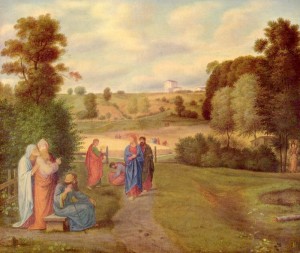Mark 12:38-44
This text is used for the Lectionary Year B on November 8, 2015.

In my mind, I see a set of paintings hanging in a gallery. In the foreground of the picture on the left, there appear two distinguished Jewish rabbis with long beards and beautiful white prayer shawls covering their heads. These proud and confident men are engrossed in a conversation that is surely about deep matters of the law. Their absorption is so complete that they have failed to notice an old widow lying prostrate in front of a house begging for help.
The picture to the right is in many ways a counterpoint to the first image. This time the figures are reversed so that we see in the foreground an old widow bathed in a soft white light. She is walking out of a temple with the faintest glimmer of a smile on her wrinkled face. Off to the right in the background and bathed in shadow stand two Jewish rabbis again clothed in finery. This time, however, they appear with hunched shoulders as they slink off in shame through another gate.

